Text
Reminder because these issues can never be talked about enough:
Missing Indigenous women and Black women and young girls are underreported and under-investigated, reflecting both racial and sex-based neglect.
A tragic example of this would be the case of Relisha Rudd, a Black 8-year-old girl who went missing in Washington, D.C., in 2014. Her case highlights the systemic failure to protect missing Black children and women and reflects both racial and sex-based neglect.
Case of Relisha Rudd:
Background: Relisha lived in a homeless shelter with her family. She was groomed by Kahlil Tatum, a janitor at the shelter who had a criminal history.
Disappearance: Relisha went missing in March 2014, but her disappearance wasn’t reported for 18 days.
Why the delay?
School officials were told she was under the care of a "Dr. Tatum" (who didn't exist).
Multiple adults in her life failed to follow up or verify her safety.
Authorities didn’t issue an Amber Alert right away, assuming family instability was at play.
Investigation:
Tatum killed his wife and later was found dead by suicide.
Relisha was never found, and the case has gone cold.
Systemic issues:
Because Relisha was a poor Black girl from a homeless family, she didn’t receive the same media coverage or urgency from law enforcement as white children typically do.
Her case exemplifies how Black girls are “adultified”, seen as less innocent, and less worthy of protection.
Broader Pattern
In the U.S., Black girls make up over 35% of all missing children, but their cases rarely get the same attention as white girls.
Similarly, in Canada and the U.S., Missing and Murdered Indigenous Women and Girls (MMIWG) is a national crisis. Indigenous women are 10 times more likely to be murdered than the national average, but their cases are often dismissed as runaways or not followed up at all.
47 notes
·
View notes
Text
If I were to poll the world’s women, particularly feminist, they’d almost all answer that the men they know personally are exceptions. Especially their husbands and sons. So what exactly is the problem? Why is feminism necessary and how is misogyny being perpetuated when you’re all empowered girl bosses with one of the good ones and a son raised to respect women? Do you know a single woman who would admit to being related to, married to, or a mother to a misogynist, let alone pedophile or rapist? I don’t. Somehow they still exist in the billions though. Who is oppressing you?
76 notes
·
View notes
Text
Me logging into tumblr for my daily 3hr scheduled dose of radical feminism and 4b propaganda

383 notes
·
View notes
Text
adriana smith who was forcibly kept on life support after being brain dead to incubate her fetus due to anti abortion laws in georgia, usa will be taken off life support this week. she had an emergency c-section today and the child was born prematurely and is in the nicu. her family is raising funds for hospital bills (that the state didn't even pay for despite forcing this "treatment" btw!) and for the new baby. donate if you can. [source]
9K notes
·
View notes
Text
I’m hearing Adriana Smith was officially declared dead. Another sister forcibly taken from us. Used like a guinea pig, as many of her foremothers before her. No mercy, no humanity was offered to her. No mercy and no humanity will we offer back to males.
I hope you can finally rest, Adriana. We won’t forgive and we won’t forget.
215 notes
·
View notes
Text
i love radblr but im begging yall to evaluate when to stop engaging with mras/misogynists/pedophilia,rape apologists. there are so many people that come to our side of tumblr just to try and piss us off and upset us. if they are spreading blatantly disprovable misinformation and hate rhetoric then do set the record straight and correct them, but if they are on their 3rd comment in a row talking about how child rape isnt a big deal and saying ���femoids” arent really oppressed. sometimes scrolling past is the only way to be fair to yourself.
425 notes
·
View notes
Text
@razgriz9203
Putting perspective onto male sexual assault rates. Dedicated to that one MRA. What does it mean to say 79% of men have reported being sexually assaulted by women? Well it doesn't mean that women are overwhelmingly forcing men to penetrate. The last part of the article states "Across United States, nearly a quarter of men reported some form of contact sexual violence in their lifetime." The male population which is (currently) 165 million. A quarter, 41 million men have been victimized by men, women or both. The 79% of female perpetrators, and 89% of male perpetrators aren't simply on their own but can suggest an overlap. This is a lifetime study conducted over the past 70-80 years or less, not an annual one. Annual estimates (that I could find) for male sexual assault in the US (of both male/female perpetrators) adds up to 400,000, add this up and the estimate is sound.
My intent isn't to downplay female perpetrators, but don't abuse statistics. Linking this post here because it also goes into more male statistics.
#male violence#radfem safe#radfeminism#general misandry and distrust of all humans#not tagging misandry for any specific reason
2 notes
·
View notes
Text

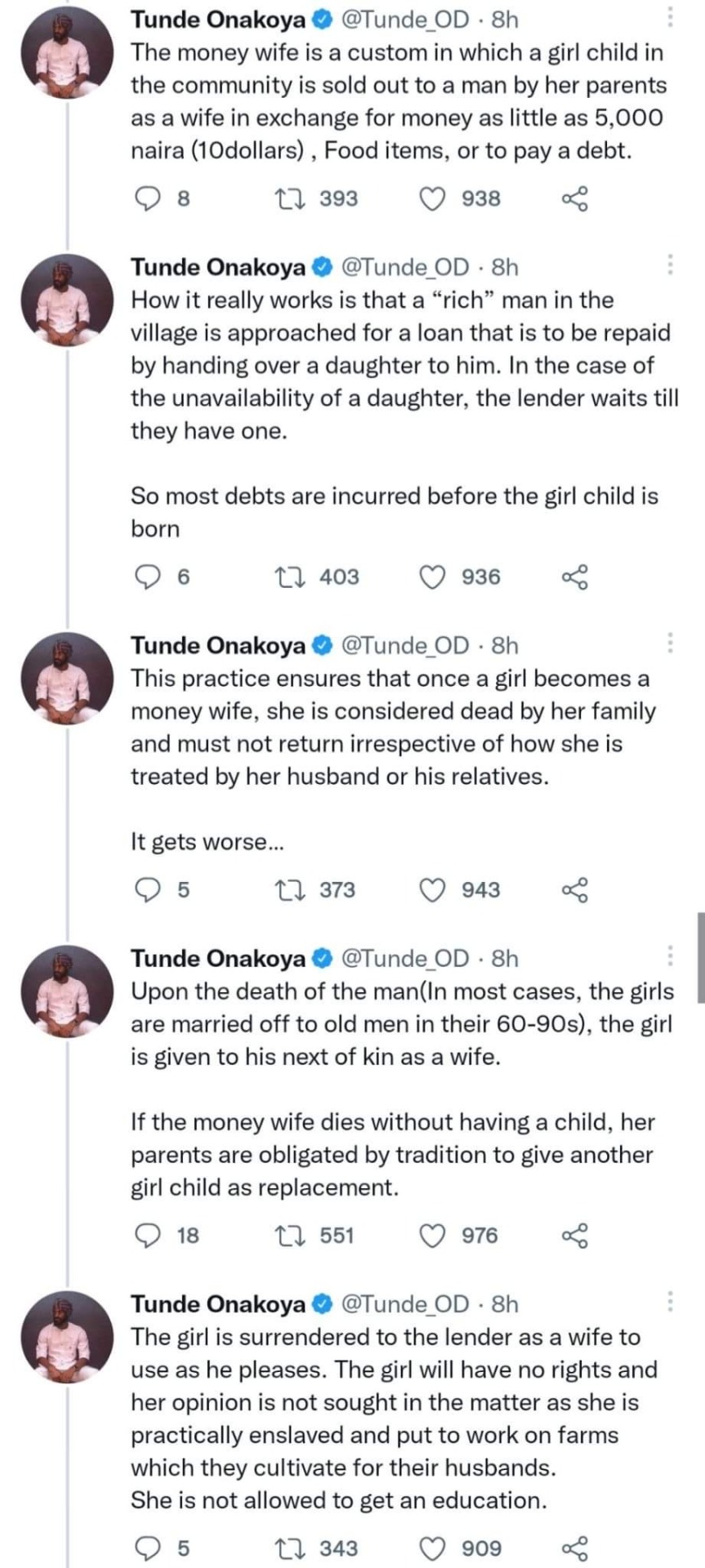
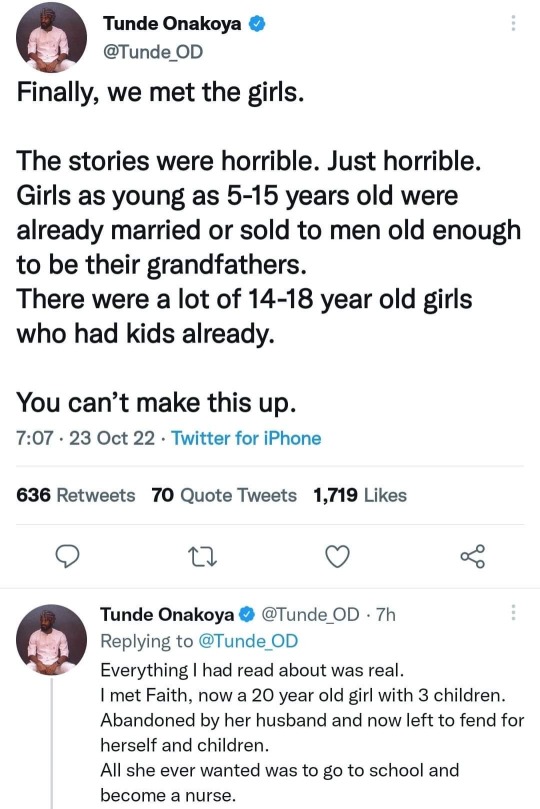
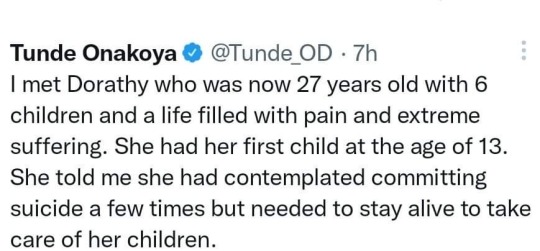


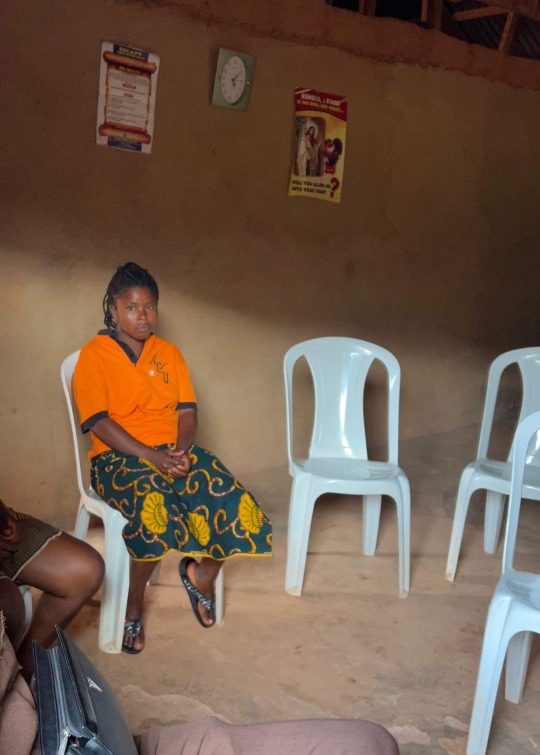

(x) “Money wives” aka culturally accepted sexual slavery of girls as young as 5-14 years in Cross Rivers State, Nigeria
2K notes
·
View notes
Text
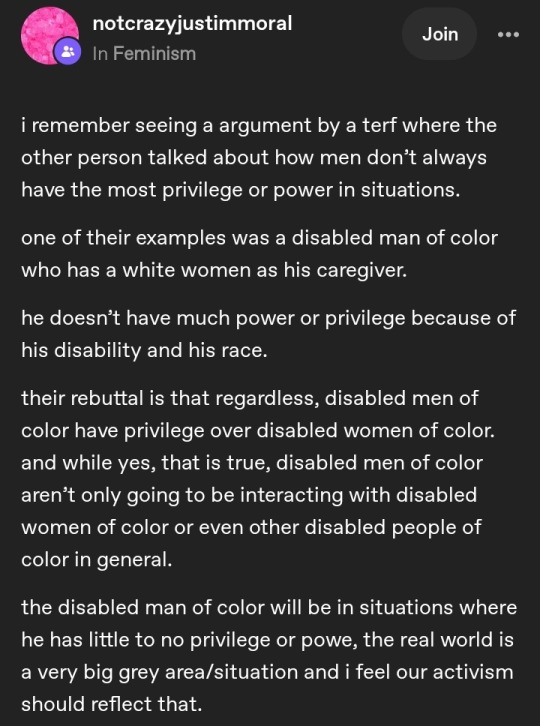
I think we're forgetting the key component here and that's, this hypothetical disabled MOC isn't being discriminated against because he's a man. Any other man could technically oppress him, but the only example OP uses is women. Of course. It's always white women versus all the other men in the world.
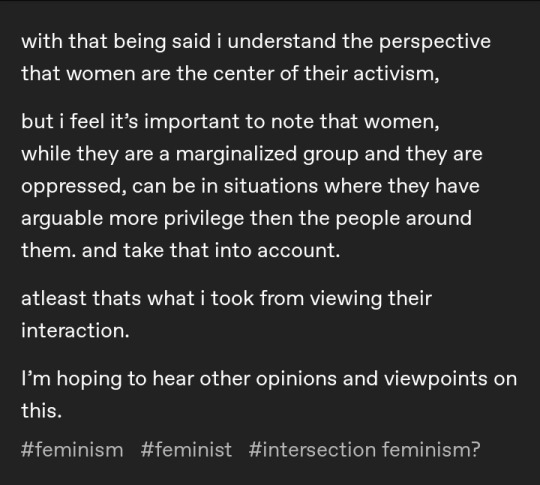
Intersectional feminism isn't all lives matter, just call yourself a humanist and move on. What's stopping one from using that label? Do people even know it exists?!? This kind of bullshitting is how feminism regressed, to the point where I think you should be embarrassed to call yourself a feminist.
Great now that we've acknowledge some women (really just white women) have privilege over everyone else what have we done to "dismantle the patriarchy". Feminism has made men a friend to the movement so its not surprising that nothing has changed.
#oh more fuel for the misanthropy#radfem safe#radical feminism#radical feminist safe#radical feminists do interact#misandry#proud misandrist#general misandry and distrust of all humans
0 notes
Note
what i think:
sex is not about showing your love and affection to your partner but degrading, objectifying and dehumanizing them. sex is not "lovemaking", it is rape.
and to rape someone you need them to be innocent, weak and physically small. the ideal victim is female but not women, it's children.
men will talk about doing/wanting to do the most humiliating things to someone they find attractive, women will talk about wanting someone they find attractive to do the most humiliating things to them ALL THE TIME and yet when you point out how evil human sexuality is suddenly it's about "loving each other" and how it's sooo awesome.
men AND women will gaslight those who choose to stay celibate/single because they don't ever want to face their own degeneracy. they will make you "the weird one" for having enough intellect, honour and self-respect to remove yourself from this animalistic way of living life.
it's funny that these pro-sex/natalist ppl will go on and on about how humanity must always exist because of our "intelligence". most ppl on earth is proof of the fact that despite having the ability to think and question things, humans will choose to not rise above their most basic instincts. we are not superior to other life forms bc of our intelligence, we are inferior to them because of our ego. they confuse egoism with intelligence.
I agree with every word of this so I'll just leave it at that. Well said.
27 notes
·
View notes
Text
Men Underestimate and Women Overestimate Their Own Sexual Violence
Time for an excellent new (2024) article "Gender Differences in Sexual Violence Perpetration Behaviors and Validity of Perpetration Reports: A Mixed-Method Study".
What this study did:
This study asked 23 men and 31 women to "think out loud while privately completing [the Sexual Experiences Survey-Short Form Perpetration (SES-SFP) survey] and to describe (typed response) behaviors that they reported having engaged in on the SES". The researchers asked anyone who "reported no such behavior ... to describe any similar behaviors they may have engaged in". They then analyzed differences in the quantitative responses (numerical values on the SES) and the qualitative responses (written descriptions and think-aloud audio).
What this study found (broad strokes):
Men’s sexual violence (SV) perpetration was more frequent and severe than women’s
Men’s verbal coercion was often harsher in tone and men more often than women used physical force (including in events only reported as verbal coercion on the SES)
Women often reported that their response to a refusal was not intended to pressure their partner or obtain the sexual activity*
Two women also mistakenly reported experiences of their own victimization or compliance (giving in to unwanted sex) on SES perpetration items, which inflated women’s SV perpetration rate
Quantitative measurement can miss important qualitative differences in women and men’s behaviors and may underestimate men’s and overestimate women’s SV perpetration
*This phrasing is poor (in my opinion) the authors are emphasizing genuine differences in men and women's reported behavior for ambiguous situations (not just their internal intent). Specifically, women would endorse responses for behaviors that (most) people would not actually consider a form of sexual violence. For example, women often indicated that the behaviors they were reporting were all pre-refusal (i.e., the women stopped and respected when their partner said no/told them to stop). Other "seducing" behaviors (e.g., kissing/touching) were also reported by women because their partner ultimately refused. Men did not report these types of behaviors, which the authors suggest is possibly because women may be more likely to remember experiences where they wanted to engage in sex with someone who did not because this violates social norms. It's also possible that men are more likely to consider these behaviors acceptable provided they stop when refused. (Ironically this suggests that the anti-feminist hyperbole that people will start recording "normal sexual interactions" as violence ... has only affected women.)
Lots more details below the cut (I use a mix of - unmarked - quotes and paraphrasing):
Quantitative data
The overall prevalence of sexual perpetration of significantly inflated due to intentional over-sampling of likely perpetrators (particularly female perpetrators). This is reasonable because the authors are interested in examining differences among self-reported perpetrators, not in establishing incidence/prevalence rates.
Even without taking the qualitative aspects into consideration (i.e., looking only at the quantitative data), men reporting SV perpetration reported more frequent offenses than women (re-offended more often). Men were also more likely to report more severe acts of violence (per the original tactic-act, the tactic specific, and sexual act specific continua).
Differences in severity identified via qualitative analysis
Men’s verbal coercion was more often stronger; more deceptive, persistent, or intimidating; or otherwise harsher in tone (e.g., "She kept refusing to do anything with me. I remember saying to her “just cause you’re on your period doesn’t mean I can’t get head.” I then remember repeating my intentions with her and almost gaslighting her and making her feel that she must not love me."). Proportionally more men described continually asking or persisting after repeated refusals, getting angry, telling lies, making false promises, and trying to make their partner feel guilty.
Women’s verbal coercion was predominantly expressing disappointment or pouting after a single refusal (e.g., “I got upset and said whatever and rolled over the opposite way”)
Also a difference in intent that could only be identified in the qualitative data. 35% of women who perpetrated explicitly said they had not intended to pressure their partner, change their partner’s mind, or obtain the sexual activity after their partner refused (e.g., "I respected him not trying to do anything further, though, and did not attempt anything further."). No men explicitly said they had not intended to pressure their partner or obtain the sexual activity and [men] more often than women explicitly said that they had intended to (e.g., "I think it was one time where I just kept pressuring . . . Didn’t happen, but the pressure was there, that’s for sure. I definitely asked more than a couple times.")
A few of women’s SV perpetration behaviors appeared more like attempts to advocate for equity in their own sexual pleasure or to stick up for themselves in response to a partner’s coercion (e.g., "I really love receiving oral sex. But sometimes my partner ignores that and directly goes to the penetration. So, I stop him and make him do it because I also feel like being properly aroused to get a better sexual experience.")
False negatives
Some participants that did not mark any of the perpetration items still described similar experiences. Most were not coercive (e.g., asking and “respecting” a refusal, clarifying an unclear refusal) but a couple were clear false negatives. There appears to be an issue with some behaviors not clearly fitting into any of the described categories (e.g., Even the physical force SES items refer only to more extreme force (holding down, pinning arms, having a weapon).)
There were many more cases where a less severe offense was marked (i.e., coded as a true positive for perpetration but for incorrect offense in severity analysis). Specifically, men reported only verbal coercion but then described physical behaviors, so the tactic report was incorrect or incomplete (e.g., "We were experimenting with different things and I did not necessarily ask for their consent before putting my finger in their butt." was coded by one man as verbal coercion).
False negative may have occurred, in part, because behaviors that were themselves no different than those performed in consensual sex were not adequately captured. This is a problem given that previous qualitative research has also found that initiating or going ahead with penetration without asking or following a refusal is a common SV perpetration behavior used by men (i.e., this type of behavior may be recorded as either a false negative or a less severe offense in quantitative scales).
When women reported verbal coercion only, but then described initiating sexual acts without asking, they almost always initiated non-penetrative sexual acts in contrast to men who more often described penetrative sexual acts without asking.
The SES may underestimate use of physical force and, especially, men’s rape and attempted rape.
False positives
Some participants reported perpetration on the SES that their description showed was not forceful, coercive, or engaged in without consent or following a refusal. Men explained that they did not engage in the behavior, misread or misinterpreted the SES question, or clicked the wrong response. Some women reported these same problems, but two "were reports of victimization or giving in to unwanted sex" (i.e., mistakenly reported victimization as perpetration).
Notably, three out of the four men with false positives reported other instances of SV perpetration on the SES whereas two of the four women with false positives did not report other perpetration and, therefore, inflated women’s perpetration rate.
Taken together, our analysis of false negatives and false positives suggests that the SES likely underestimates men’s SV perpetration and overestimates women’s perpetration.
This doesn't even account for instances reporting no intent to perpetrate (as described above). But the fact that many women reported no intent may further support the conclusion that women overreport or are more likely to remember and report because their coercion violates social expectations
Verbalized thought processes
In general, most participants appeared to understand and interpret the SES as intended
But there was evidence that the distinction between attempted and completed acts on the SES may be unclear for some respondents (e.g, one woman said "I also don’t understand what they mean by “tried.” Like does this mean that . . . You simply spoke to them, and they said no? Does this mean that you were engaged in an act and they pushed you off? Or does this mean that something disrupted you? So, this question doesn’t seem very clear to me.")
Second, participants used different items on the SES to report having used a specific category of tactic that is not mentioned in the measure. For example, some participants described kissing and sexually touching their partner without asking to try to arouse them and reported this as verbal tactics to obtain non-penetrative sexual contact. This may have underestimated attempted and completed sexual coercion (because the intent was to engage in penetrative sex). It may also have overestimated non-consensual non-penetrative sexual contact category (the most frequent category for female offenders) since research also finds that partners often use nonverbal cues including kissing and touching to communicate about sexual interest.
There was also confusion about the meaning of “getting angry” or "showing displeasure". Some participants (particularly women) indicated these could refer to internal feeling as opposed to external expression or be a “normal human reaction to . . . feeling rejection” that does not necessarily include a purposeful attempt to manipulate.
Other problems: (1) confusion on if intoxication only applied to alcohol, (2) too many tactics listed in a single question resulting in confusion, (3) participant frequency estimates were rough estimates likely contributing to a significant underestimation problem, (4) participants wouldn't endorse items that specified "without consent" even if they later described coercive behaviors suggesting different phrasing may be needed, (5) participants reported shock at the severity of the tactics asked about, which may indicate SV is not normalized among non-perpetrators or may indicate that less severe tactics are not being captured
Concerning (4) above: Other research indicates that while conceptually narrower, asking about behaviors done after someone resisted or indicated “no” (i.e., post-refusal persistence) results in higher rates of self-reported SV perpetration than asking about behaviors done without consent or when the other person did not want to.
Citation: Jeffrey, Nicole K., and Charlene Y. Senn. “Gender Differences in Sexual Violence Perpetration Behaviors and Validity of Perpetration Reports: A Mixed-Method Study.” The Journal of Sex Research, Feb. 2024, pp. 1–16. DOI.org (Crossref), https://doi.org/10.1080/00224499.2024.2322591.
32 notes
·
View notes
Text
Sometimes I'll be scrolling tags minding my own business, then I'll suddenly be jump-scared by Klance. It brings back my war ptsd of being a Sheith shipper back in Voltron's prime. I'll never be able to look at Klance without shuddering at sight. I blocked the tag, because I couldn't stand it no more.
Edit: To me, Klance is like a slur. I view it as what ruined Voltron, and it makes me get annoyed every time I see it. I never will be able to like Klance. The ship itself is "meh" but the shippers are insufferable. And, Klance shippers, don't think harassing me will change anything. That will just prove my point.
68 notes
·
View notes




